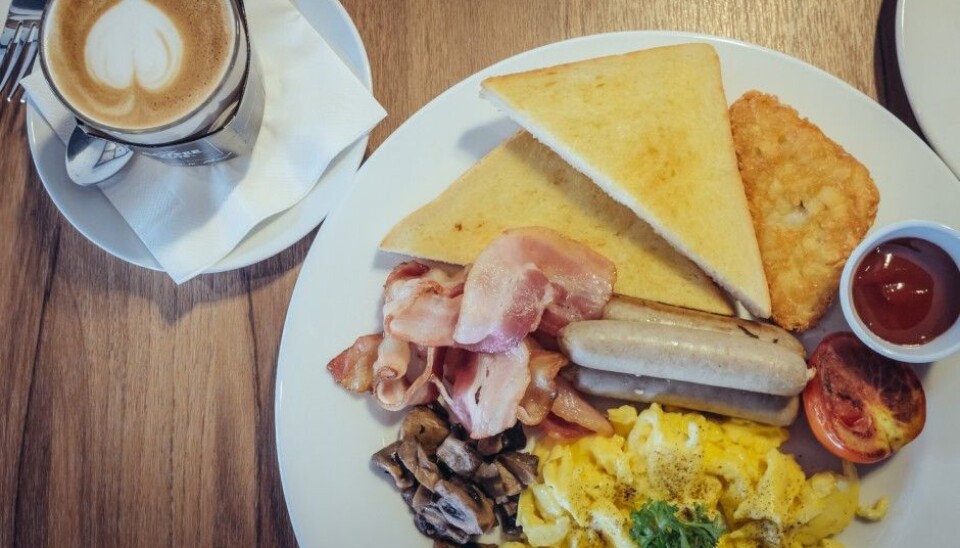
More calories burned with one large meal instead of several small ones
Weight watchers might be keen to hear that calorie intake is not a simple factor of metabolism. What you eat and how you eat it can have an effect on how much energy a body burns and how full a person feels.
Food does not just provide the body with its fuel. The digestion process also uses energy. We expend some of the calories from our food while digesting it. How many?
Dieticians used to say it was smart to eat many small meals to keep metabolism running all day long.
Studies came later reporting that it was inconsequential how a person spreads their calorie intake – across many small meals or two or three larger ones.
Swedish researchers have taken this a step further: Simon Ingves and colleagues from Linköping University ran an experiment and conclude that the body burns more calories if the morning intake consists of one large breakfast rather than five small ones made up of an equivalent amount of food.
The results also indicate that a large meal with lots of carbohydrates leads to the burning of more calories than a comparable meal with lots of fat. But there is one catch here to keep in mind. Ingves and colleagues point out that calories in the form of fat keep a person feeling full longer.
So it might be easier for a person to eat too much if he or she sticks to a low-fat diet, says one of the authors, Fredrik Nyström, to ScienceNordic’s partner forskning.se.
Drank the meal
The Swedish researchers got seven women and seven men to participate in their study. All were young, healthy and had normal weights. They were split into four groups and all received a 750-calorie breakfast in the morning.
The calories were given as a liquid, a mixture consisting of milk, cream, eggs, blueberries and sugar.
The participants in two of the groups consumed this drink all at once, as a large breakfast. The others drank theirs in five 150 calorie doses every 30 minutes in the course of two-and-a-half morning hours.
The drink given to two of the groups had the same caloric count but consisted either of lots of sugar and little fat, or lots of fats and little sugar. The protein content of all the drinks was the same.
The experiment was repeated later in a rotation enabling all the participants to try all four alternatives.
In every test the researchers measured how much energy the participants burned by 2.5 hours after their first gulp of liquid breakfast. The researchers also measured how full the participants felt and their levels of certain hormones that steer satiety and hunger.
Felt fuller
The result hammered a nail in the coffin of the multi-meal diet.
Those who drank their entire breakfast at once burned much more energy in the course of the AM, as compared to those who divided their caloric intakes into five small meals.
Those who drank a single meal also reported feeling full in the next nearly two-and-a-half hours. This was backed up physiologically, as they had higher levels of hormones that cause a feeling of satiety and fewer that prompt hunger pangs, as compared to participants who had five small meals.
This was seen whether their 750 calories came from lots of fat or little.
But it appeared that energy consumption was higher among those who ate lots of carbs than those who ate lots of fats.
The drink that was rich in fat triggered the best feeling of satiety or fullness. When the participants were given the fattier meals they felt fuller. They also had higher levels of hormones that trigger this feeling of having one’s fill and lower levels of hunger-provoking ones.
This could mean that persons who diet on low-fat food could be tempted to eat more food than those who eat a fattier diet.
But this prospective problem with low-fat diets has not been substantiated yet.
Weaknesses
In 2009 a study found that saturated fatty acids do not provide a feeling of fullness. On the contrary, they trick us into eating more.
Other studies have concentrated on different aspects, for instance showing that the consistency of the food has a big impact on the sense of being full and content.
The latest Swedish study also has its drawbacks.
First of all, this study was all about the first part of the day. Nothing is known about what or how much the participants ate the rest of the day, nor what their experiences of satisfaction or hunger were throughout the afternoon and evening.
Another issue is that 14 test persons comprise an infinitesimal selection of humanity. Perhaps big individual differences are at play in how we react to meal rhythms and compositions of foods. With so few subjects, incidental individual differences could have packed quite a statistical wallop.
Thirdly, the test was done on healthy persons of normal weight in their twenties. The results might not necessarily apply to others outside these categories.
-------------------------------------
Read the Norwegian version of this article at forskning.no
Translated by: Glenn Ostling







